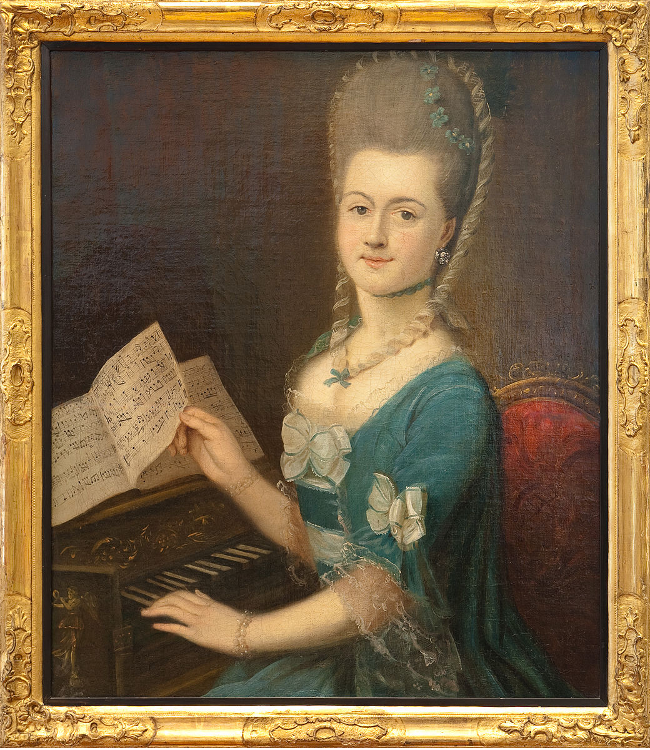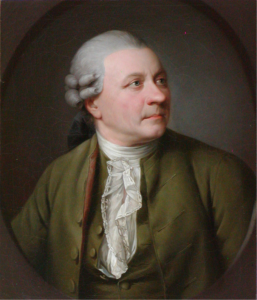Song of the fatherland
(Poet's title: Vaterlandslied)
Set by Schubert:
D 287
[September 14, 1815]
Ich bin ein deutsches Mädchen,
Mein Aug’ ist blau und sanft mein Blick,
Ich hab ein Herz
Das edel ist und stolz und gut.
Ich bin ein deutsches Mädchen!
Zorn blickt mein blaues Aug’ auf den,
Es hasst mein Herz
Den, der sein Vaterland verkennt!
Ich bin ein deutsches Mädchen!
Erköre mir kein ander Land
Zum Vaterland,
Wär mir auch frei die große Wahl!
Ich bin ein deutsches Mädchen!
Mein hohes Auge blickt auch Spott,
Blickt Spott auf den,
Der Säumens macht bei dieser Wahl.
Du bist kein deutscher Jüngling!
Bist dieses lauen Säumens wert,
Des Vaterlands
Nicht wert, wenn du’s nicht liebst, wie ich!
Du bist kein deutscher Jüngling!
Mein ganzes Herz verachtet dich,
Der’s Vaterland
Verkennt, dich Fremdling! und dich Tor!
Ich bin ein deutsches Mädchen!
Mein gutes, edles, stolzes Herz
Schlägt laut empor
Beim süßen Namen: Vaterland!
So schlägt mir´s einst beim Namen
Des Jünglings nur, der stolz wie ich
Auf´s Vaterland,
Gut, edel ist, ein Deutscher ist!
I am a German girl!
My eye is blue, and the way I look is gentle,
I have a heart
That is noble, and proud, and good.
I am a German girl!
My blue eye looks with anger on those,
My heart hates
Those, who fail to appreciate their fatherland!
I am a German girl!
I would not choose any other land
As my fatherland,
Even if I had complete freedom of choice!
I am a German girl!
My lofty eye also looks with scorn,
Looks with scorn on those
Who hesitate when making this choice.
You are no German youth!
This lukewarm hesitation is not worthy,
The fatherland is something
You are not worthy of, if you do not love it as I do!
You are no German youth!
My whole heart despises you,
For whom the fatherland is something that is
Not sufficiently appreciated, you outsider, and you fool!
I am a German girl!
My good, noble, proud heart
Rises up and beats loudly
At the sweet name: Fatherland!
Similarly there will be a time when it beats at the sound
Of the very youth who is as proud as I am
Of the fatherland,
Who is good and noble, who is a German!
All translations into English that appear on this website, unless otherwise stated, are by Malcolm Wren. You are free to use them on condition that you acknowledge Malcolm Wren as the translator and schubertsong.uk as the source. Unless otherwise stated, the comments and essays that appear after the texts and translations are by Malcolm Wren and are © Copyright.
☙
Themes and images in this text:
Blue Eyes Gazes, glimpses and glances Germany and being German Hearts Names Sweetness
When this poem was first published in the 1771 Hamburg edition of Klopstock’s Odes the title was given as ‘Vaterlandslied zum Singen für Johanna Elisabeth von Winthem‘ (Song of the fatherland for Johanna Elisabeth von Winthem to sing). Johanna Elisabeth (née Dimpfel) was 23 years old when the poem was written in 1770, and she was the niece of Klopstock’s first wife, Meta Müller, who had died in childbirth in 1758. Much later (in 1791), after she had been widowed, the 67 year old Klopstock (hardly the youth of the poem) married her (there being no rules about not being able to marry your deceased wife’s widowed niece). Brüning’s 1775 portrait of her, now in the Museum of the History of Hamburg, presents her at a piano with the score of C.P.E. Bach’s setting of Vaterlandslied (first published in 1774).

with a copy of Klopstock’s Vaterlandslied, set to music by C.P.E. Bach.
The Nazis and other crude nationalists who claimed a sort of ownership of this patriotic song might have been surprised at how un-German (in their terms) she appeared in the image. Her blue dress and accessories may indeed be intended to accentuate the hint of blue in her eyes, but there can be no getting round the fact that the whole style of presentation is inspired by France. Her coiffure is à la mode. Whatever patriotism meant for her (and it clearly meant something since she chose to be portrayed performing the Vaterlandslied) it did not involve a rejection of other nations and other styles.
We can be fairly certain that Klopstock’s own approach to German nationalism was free from any form of racism (despite the reference to the blue eyes) since he published extensively on the theme of Germany and the fatherland, and the focus of his concern was education and culture. He wrote poems and a trilogy of plays about Arminius, the Germanic hero who defeated the Romans (according to the Annals of Tacitus), in which the hero (de-Latinized and re-Germanized as Hermann) has to battle with fellow Germans who have absorbed Roman culture and values. Klopstock and his contemporaries would have been conscious of the parallels with Frederick the Great of Prussia, who commissioned artistic work by ‘foreigners’ but did nothing to promote literature in the German language. In 1774 Klopstock published a major work, a sort of pacifist Utopia setting out what a ‘German’ republic could be like given sufficient education and commitment to spiritual and cultural development: ‘Die deutsche Gelehrtenrepublik‘ (The German Educated Republic). In this reworking of Plato’s Republic Klopstock presented a vision of a community of scholars and writers who would give voice to German sensibility but without any trace of triumphalism or sense of superiority.
Note that although there is a tone of scorn in Vaterlandslied, the people who are despised are not the British and the French but German lads who are not sufficiently committed to the cause of German renewal. It would be interesting to know how people might have made the counter-argument, a defence of international or at least pan-European culture, at the time. What we do know is that Klopstock’s text was sufficiently provocative to elicit parody (or is it ‘hommage’?). Matthias Claudius published ‘Ich bin ein deutscher Jüngling‘ in 1781:
Ich bin ein deutscher Jüngling
Mein Haar ist kraus, breit meine Brust;
Mein Vater war
Ein edler Mann, ich bin es auch.
Wenn mein Aug’ Unrecht siehet,
Sträubt sich mein krauses Haar empor,
Und meine Hand
Schwellt auf und zuckt und greift ans Schwerdt.
Ich bin ein deutscher Jüngling!
Beym süßen Namen “Vaterland”
Schlägt mir das Herz,
Und mein Gesicht wird feuerroth. —
Ich weiß ein deutsches Mädchen;
Ihr Aug ist blau, und sanft ihr Blick,
Und gut ihr Herz,
Und blau, o Hertha, blau ihr Aug!
Wer nicht stammt vom Thuiskon,
Der blicke nach dem Mädchen nicht!
Er blicke nicht,
Wenn er nicht vom Thuiskon stammt!
Denn ihres blauen Auges
Soll sich ein edler Jüngling freun!
Sie soll geliebt,
Soll eines edlen Jünglings seyn!
Ich bin ein deutscher Jüngling,
Und schaue kalt und kühn umher,
Ob einer sey,
Der nach dem Mädchen blicken will.
I am a German lad,
My hair is frizzy, my chest is broad;
My father was
A noble man, so am I.
When my eye sees injustice
My frizzy hair stands on end,
And my hand
Swells up and twitches and reaches for my sword.
I am a German lad!
At the sweet name, ‘Fatherland’,
My heart beats strongly
And my face turns as red as fire. – –
I know of a German girl;
Her eye is blue, and the way she looks is gentle,
And her heart is good,
And blue, o Hertha, her eye is blue!
Anyone who is not descended from Tuisco
Is not to look at that girl!
He shall not look
If he is not descended from Tuisco!
For her blue eyes
Shall give joy to a noble lad!
She will be loved,
She will belong to a noble lad!
I am a German lad
And I look around, cold and bold,
To see if there is anyone
Who wants to look at that girl.
"In their ancient songs, their only way of remembering or recording the past, they celebrate an earth-born god, Tuisco, and his son Mannus, as the origin of their race, as their founders." Tacitus, Germania 2:2 English edition A.J.Church et al.
☙
Original Spelling Vaterlandslied Ich bin ein deutsches Mädchen! Mein Aug' ist blau, und sanft mein Blick, Ich hab ein Herz Das edel ist, und stolz, und gut. Ich bin ein deutsches Mädchen! Zorn blickt mein blaues Aug' auf den, Es haßt mein Herz Den, der sein Vaterland verkent! Ich bin ein deutsches Mädchen! Erköhre mir kein ander Land Zum Vaterland, Wär mir auch frey die große Wahl! Ich bin ein deutsches Mädchen! Mein hohes Auge blickt auch Spott, Blickt Spott auf den, Der Säumens macht bey dieser Wahl. Du bist kein deutscher Jüngling! Bist dieses lauen Säumens werth, Des Vaterlands Nicht werth, wenn du's nicht liebst, wie ich! Du bist kein deutscher Jüngling! Mein ganzes Herz verachtet dich, Der's Vaterland Verkent, dich Fremdling! und dich Thor! Ich bin ein deutsches Mädchen! Mein gutes, edles, stolzes Herz Schlägt laut empor Beym süßen Namen: Vaterland! So schlägt mirs einst beym Namen Deß Jünglings nur, der stolz wie ich Aufs Vaterland, Gut, edel ist, ein Deutscher ist!
Confirmed by Peter Rastl with Klopstocks Oden. Erster Band. Leipzig bey Georg Joachim Göschen. 1798, pages 300-301; and with Oden von Klopstock. WIEN, gedruckt bey Joh. Thomas Edlen von Trattnern, k.k. Hofdruckern und Buchhändlern. 1784, pages 293-294.
Confirmed with Matthias Claudius, Werke, Erster Band, Siebente wohlfeile Auflage, Hamburg & Gotha: bei Friedrich und Andreas Perthes, 1844, pages 111-112.
To see an early edition of the text, go to page 300 [318 von 356] here: http://digital.onb.ac.at/OnbViewer/viewer.faces?doc=ABO_%2BZ223304809


